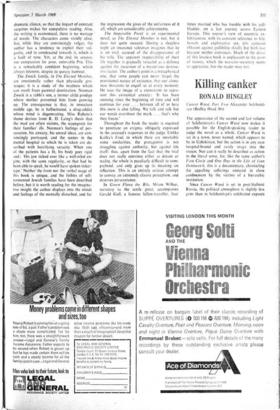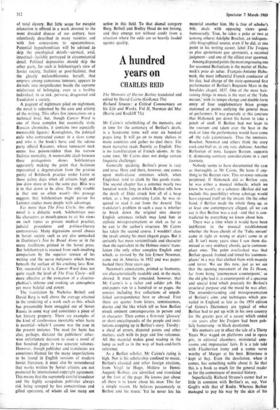Killing canker
RONALD HINGLEY
The appearance of the second and last volume of Solzhenitsyn's Cancer Ward now makes it possible for the English-speaking reader to judge the novel as a whole. Cancer Ward is set in a town, never named, which appears to be in Uzbekistan, but the action is in any case hospital-bound and rarely strays into the streets. Nor can it really be described as action in the literal sense, for, like the same author's First Circle and One Day in the Life of Ivan Denisovich, this is a documentary, chronicling the appalling sufferings endured in close confinement by the victims of a hierarchic institution.
Since Cancer Ward is set in post-Stalinist Russia, the political atmosphere is slightly less grim than in Solzhenitsyn's celebrated exposes of total slavery. But little scope for escapist relaxation is offered in a work devoted to the most dreaded disease of our century, here relentlessly described in many varieties and with few concessions to squeamishness. Potential hypochondriacs will be advised „to skip the oncological details—cervical, anal, intestinal—lavishly portrayed in circumstantial detail. Political depressives should skip the other parts, for such is Solzhenitsyn's view of Soviet society, Stalinist or post-Stalinist, that the ghastly melanoblastoma herself, that empress among cancerous tumours, appears to dwindle into insignificance beside the supreme misfortune of belonging, even as a healthy individual, to so sick, perverse, dragooned and fraudulent a society.
A pageant of nightmare piled on nightmare, the novel is redeemed by the care and artistry of the writing. This offers few innovations on a technical level, but, though Cancer Ward is one of those complex but essentially static Russian chronicles, it contains two especially memorable figures: Kostoglotov, the political exile who contracted cancer in a slave camp and who is the book's hero, and the odious party official Rusanov, whose tumescent neck seems less poison-ridden than his narrow Stalinist mentality. A memorable clash between these protagonists shows Solzhenitsyn apparently making the point that Stalinism represented a degeneration from the pristine purity of Bolshevik practice under Lenin in those palmy days when all citizens high_and low drew more or less the same pay. Bliss was it in that dawn to be alive. The only trouble is that one so often wasn't—this passage suggests that Solzhenitsyn might pursue his Leninist studies more deeply with advantage.
Far more than The First Circle, this other novel is a didactic work. Solzhenitsyn uses his characters as mouth-pieces to air his views on such topics as private medical practice, judicial procedures and politico-literary controversies. Many digressions unveil abuses in Soviet society such as are also unmasked in Dudintsev's Not by Bread Alone or in the many feuilletons printed in the Soviet press. But Solzhenitsyn is rescued from such insulting comparison by the superior texture of his writing and the saeva indignatio which burns beneath the surface of his crushing lava flow. Yet, successful as it is, Cancer Ward does not quite reach the level of The First Circle—still more effective as the evocation of a claustro- phobiac's inferno and evoking an atmosphere yet more baleful and potent.
The translation by Nicholas Bethel' and David Burg is well above the average attained in the rendering of a work such as this, which has presumably been smuggled out of Soviet Russia in some way and constitutes a piece of hot literary property. There are examples of the kind of carelessness inevitable when haste is essential—whichq assume was the case in the present instance. The need for haste has also, perhaps, dictated the publishers' other- wise unfortunate decision to issue a novel of five hundred pages in two separate volumes. However, though publisher and translators are sometimes blamed for the many imperfections to be found in English versions of modern Soviet literature, it must also be remembered that works written by Soviet citizens are not protected by international copyright agreement.- This means that the supremely careful translator and the highly scrupulous publisher always risk being scooped by less conscientious and gifted operators, of whom all too many are active in this field. To that dismal category Burg, Bethel and Bodley Head do not belong, and they emerge not without credit from a situation where the odds are so heavily loaded against quality.



































 Previous page
Previous page